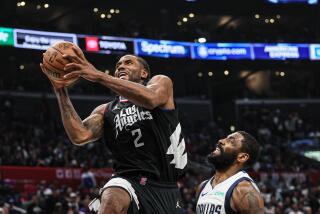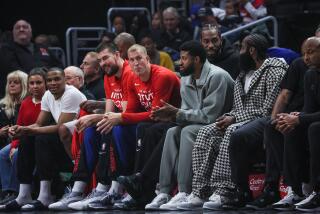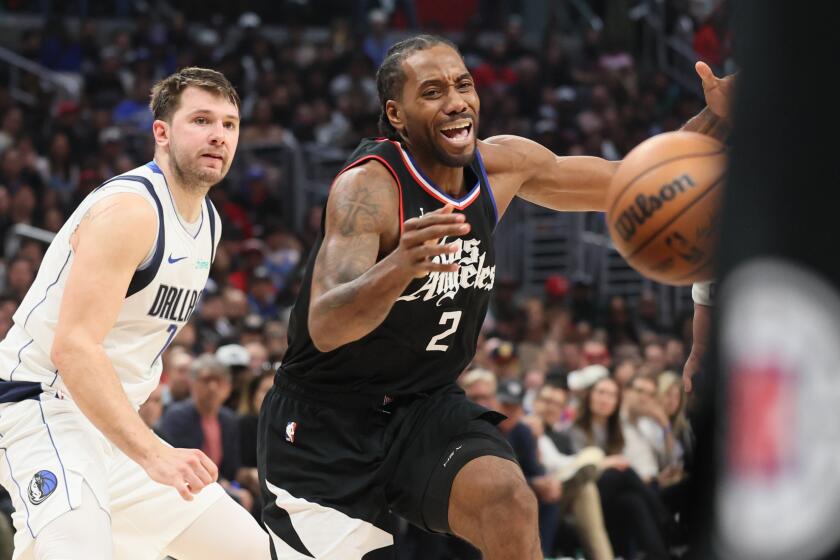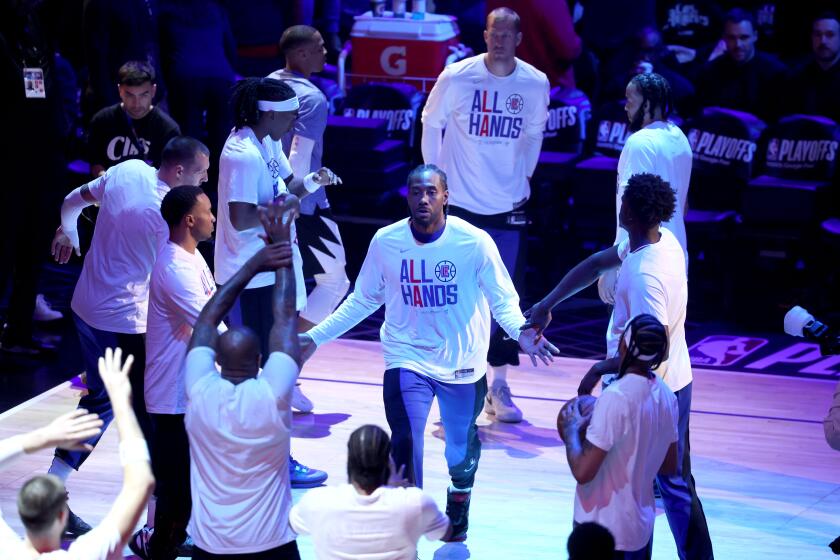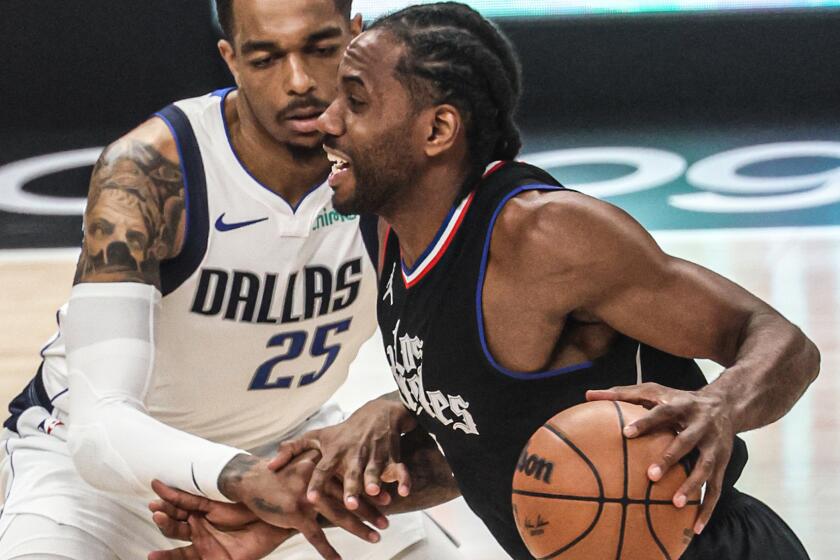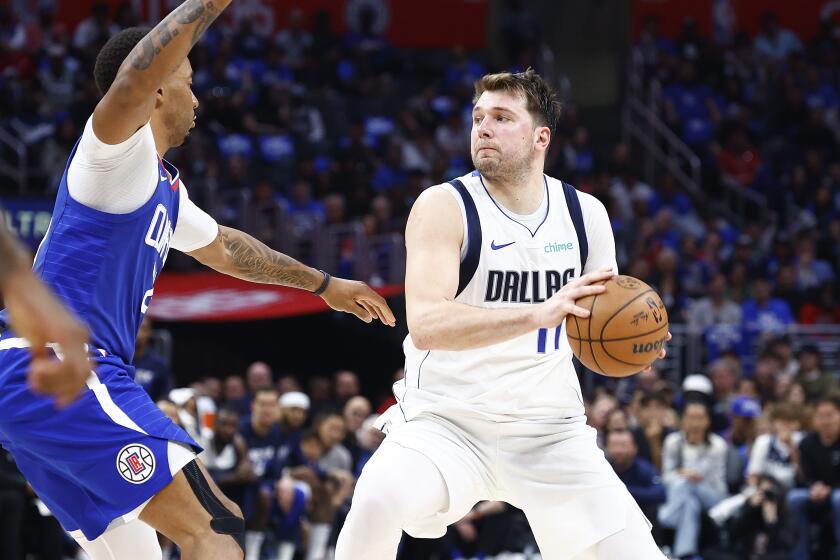Disciple of Discipline : Coach Bill Fitch Has Reputation as a Tough Rebuilder, and That May Be Put to Test With Clippers
Bill Fitch, the Clippers’ new coach, learned discipline from his father, Doc, a former Marine drill instructor.
“I was 14 years old before I found out I wasn’t in the Marine Corps, because I lived like a Marine,” Fitch said.
“I had nobody to share that razor strap with. I was an only child. There’s many a day I would have loved to have had a brother to blame something on.”
Fitch, 60, has applied the lessons of his youth.
A stern disciplinarian who motivates through intimidation, he has become the NBA’s fifth-winningest coach, having compiled a record of 844-878 in 21 seasons.
“A lot of times I’ve had great players that I didn’t expect to like me and some of them became great players because they didn’t like me and I wouldn’t let them like me,” Fitch said.
Still, he is revered by some of his former players.
“Bill Fitch saved my life,” said John Lucas, coach of the Philadelphia 76ers.
He credits Fitch with helping him recover from a cocaine addiction. Fitch cut Lucas from the Houston Rockets in 1984 because of Lucas’ drug problem and re-signed him after Lucas had finished rehab in 1985.
“He wouldn’t allow me to continue to play when other people wanted me to continue to play basketball when my drug use was up,” Lucas said. “He said, ‘No more, John. I don’t care what anybody else says, I’m not going to let you play anymore.’
“To this day I’m grateful to him. He taught me more as a coach about life and living life on life’s terms than anybody I’ve dealt with before. I had some of my best years with him and I didn’t do it with points, I did it with knowledge of the game.”
Although some regard Fitch’s methods as archaic and maintain that the game has passed him by, he coached the Boston Celtics to the 1981 NBA championship and the Rockets to the 1986 NBA finals.
“He’s a very good teacher,” said Celtic President Red Auerbach, who hired Fitch. “He’s a disciplinarian. That’s his big asset.”
Atlanta Coach Lenny Wilkens, who played for Fitch in Cleveland, agreed.
“I don’t think anybody is more prepared than Bill Fitch,” Wilkens said. “I’ve played for a lot of coaches and seen a lot of guys work, but I don’t know that anyone prepares as much or as diligently as he does.”
But has he changed with the times?
“Over the years, I didn’t see him change his style to really accommodate the change in the players in the league,” said Fitch’s daughter, Lisa, associate women’s basketball coach at Wright State University in Dayton, Ohio.
And Fitch, who rejuvenated mediocre NBA teams in Cleveland, Boston, Houston and New Jersey, faces what may be his biggest challenge yet, rebuilding the Clippers, who had the NBA’s seventh-worst record last season.
Fitch will be quite a contrast to easygoing Bob Weiss, who was fired with two years left on a three-year contract.
Fitch plans to bar reporters from the first three days of training camp, which may feel like boot camp--”Anybody who’s in shape can go through my camps, but God help ‘em if they’re not”--so that the players can concentrate.
“Fitch is a bottom-line kind of guy,” Clipper captain Gary Grant said. “We need someone to come in and say, ‘This is the way it’s going to be. Period.’ He’ll do that.”
Hired by the Clippers after a 73-day search, Fitch signed a four-year contract last month.
“He has the kind of credibility in turning teams around we need here,” General Manager Elgin Baylor said. “He’s a hard worker, a disciplinarian. Someone the players will respect.”
The Clippers, who made the playoffs twice under former coach Larry Brown, will be starting over under Fitch, who has twice been named the NBA’s coach of the year.
He has a lot of holes to fill before the season opener Nov. 4 against the Portland Trail Blazers in Yokohama, Japan.
All-Star forward Dominique Wilkins, the Clippers’ leading scorer last season, signed an $11-million, three-year contract with the Celtics last month and disgruntled guard Mark Jackson was traded to the Indiana Pacers for guard Pooh Richardson, forward Malik Sealy and rookie forward Eric Piatkowski.
The Clippers could also lose free-agent guard Ron Harper, their second-leading scorer. They are still hoping to re-sign him, however.
But the Clippers’ bleak outlook doesn’t scare Fitch, the ninth coach the club has had since moving here in 1984.
“This isn’t scary,” Fitch said. “Scary is being the first outsider coach in Boston. Scary is worrying if you’ll live up to the Celtic family. Scary is being the first coach in Cleveland, losing your first 15 games and wondering if you’ll ever win.”
*
Fitch thought he would never coach again after resigning under pressure from the New Jersey Nets after the 1992 season.
“I had a good ride,” Fitch said. “But I thought I’d had enough.”
Although Fitch led the woeful Nets to their first playoff berth in five seasons, he openly feuded with management after guard Kenny Anderson was drafted over his objections. Minority owner Joe Taub responded by trying to replace Fitch with Jim Valvano in midseason.
And the Net players openly revolted against Fitch.
All-Star forward Derrick Coleman and guard Chris Morris refused to play in the final week of the season. Fitch didn’t fine or suspend them because he needed them in the playoffs.
He said, however, that the mutiny didn’t influence his decision to quit.
“You have altercations and problems with players from Day 1,” he said. “If you take 20 married couples, there isn’t one of them that doesn’t have (arguments), but they don’t have all their arguments with (reporters) sitting there.
“The same thing went on 20 years ago, but none of this used to escape. Now you’re more approachable (because of increased media access). That didn’t affect me.”
He retired to his lakeside home outside Houston, content to fish and play golf while the Nets paid off the final two years of his contract.
Fitch’s only link to the NBA was his satellite dish. One of the first coaches to use videotape as a scouting tool, Fitch taped every NBA game and broke down the tapes as if he were still coaching.
“The joke back home is that if you’re lost at night, just look to the orange cast in the sky with me switching that satellite dish around and you can get your bearings real quick,” Fitch quipped.
Fitch, who rejected several European coaching offers, realized how much he missed the sidelines while coaching a team of college players at an NBA pre-draft tournament in Phoenix last spring.
“The thing that you can’t replace is being with a group of guys in competition,” Fitch said. “You can’t replace that.”
Fitch’s love of competition began on the playground.
Born in Davenport, Iowa, he grew up in Cedar Rapids, where he is remembered as one of the best athletes the city has produced.
“I lived right across the street from an elementary school, which had a gravel football field,” Fitch said. “We’d play football on the gravel. In my neighborhood, even a touch football game turned into tackle football.”
Fitch excelled in basketball and baseball.
An all-state guard, he was recruited by Kansas basketball Coach Phog Allen, but decided to enlist in the Marines in 1950, after the outbreak of the Korean War.
“I was underage when I enlisted and my dad had the good fortune to get me out,” Fitch said. “A couple of the guys I was with, one of them came back a year later with fragments of shrapnel and the other guy never came back.”
Returning home, Fitch went to tiny Coe College in Cedar Rapids, where he played baseball and basketball.
Theron Thomsen, former Coe basketball coach who later gave Fitch his first coaching job, sensed early on that Fitch would make a good coach.
“He had the makings of a coach right from the start,” Thomsen said. “He was a coach on the floor and he knew the game. He was smart and he was always trying to figure out a better way to do something.”
Drafted by the old St. Louis Hawks, Fitch rejected the Hawks’ meager offer to pursue a major league baseball career.
“The bonus would have been a new suit,” Fitch said. “The money was trivial in those days. Ben Kerner was the owner of St. Louis then and I remember him telling me that Bob Harrison, the starting guard on the Minneapolis Lakers championship team, only made $3,800.”
But a two-year Army hitch stalled Fitch’s baseball career.
After he was discharged in 1956, Fitch followed Thomsen to Creighton, where he was the baseball coach and an assistant basketball coach. Fitch coached Hall of Fame pitcher Bob Gibson in both sports at Creighton.
“Until (Larry Bird) came along, Gibson was the toughest competitor I ever saw,” Fitch said. “If you were flipping coins two out of three and he lost, he was liable to break your thumb.”
Fitch left in 1958 to become the basketball coach at Coe, where he compiled a 44-40 record in four seasons before he was hired by North Dakota. There he coached Phil Jackson, who won two NBA titles while playing for the Knicks and coached the Chicago Bulls to three consecutive NBA titles.
“Basketball was nothing when I went (to North Dakota), but they had a field house that was better than what we had at Creighton,” Fitch said. “But it just sat there. It was a warming stop for the people going to hockey games. If there was a basketball game going on, they’d watch it and then go over to hockey.”
Fitch tricked some recruits into coming to frigid North Dakota.
“I’d go through the grades when I was recruiting and if they had a low mark in geography I’d go after them,” Fitch said. “I’d tell them that it was cold, but it was a dry cold.”
North Dakota won a total of 24 games in his first two seasons, then the program took off. Fitch guided the Fighting Sioux to three consecutive 20-win seasons and two trips to the Division II final four before moving on to Bowling Green in 1967.
After coaching Bowling Green to the 1968 Mid-American Conference title, Fitch was hired by the University of Minnesota.
He had to live in Williams Gym for 10 days during his first season when his three daughters caught chickenpox.
“I’d never had chickenpox and it went from one daughter to the next so I didn’t go home.” Fitch said. “I set up a cot in the gym and that’s where I stayed.”
Fitch, who had only two losing seasons in 12 years as a college coach, didn’t get off to a good start in the NBA as the first coach of the expansion Cleveland Cavaliers in 1970.
The Cavaliers lost their first 15 games and finished with a 15-67 record.
“Bill does not like to lose--none of us do,” Lenny Wilkens said. “But I’ve never seen anyone take losing as hard as him. It was an expansion team with a lot of kids who didn’t know their way around the block and it took time. It just wasn’t going to happen overnight.”
After enduring five consecutive losing seasons, Fitch was named coach of the year in 1976, after leading the Cavaliers to the Central Division title with a franchise-record 49 victories. Cleveland advanced to the Eastern Conference finals, losing to the Celtics in six games.
Fitch resigned on May 21, 1979, after the Cavaliers’ first losing season since 1973-74. Two days later, he was hired by the Celtics, who had won 27 games the previous season.
Fitch, who inherited rookie forward Larry Bird in his first season, guided the Celtics to a 61-21 record, the biggest turnaround in NBA history. Boston won the NBA title in his second season.
The Celtics appeared to be on the verge of a dynasty, but Fitch couldn’t sustain it and resigned under fire in 1983 after Boston was eliminated in the first round of the playoffs amid reports that the Celtics had rebelled against his coaching methods.
Fitch maintains that he quit because owner Harry Mangurian, who had brought him to Boston, sold the Celtics.
“What happened was blown out of proportion,” Fitch said. “There were stories that M.L. Carr threw a ball at me and we got into a fight. I can still remember the day he threw the ball. It missed me. I turned around and threw it by his head.”
Mangurian concurred.
“I decided I was going to sell the team and he made up his mind that he was going to leave,” Mangurian said. “We got along real well. We had a nice business relationship and we had a nice personal relationship.”
K.C. Jones, who had been Fitch’s assistant, succeeded him and led Boston to two NBA titles in his first three seasons, the Celtics thriving under Jones’ easygoing style.
Fitch was hired in 1983 to rebuild the Rockets, who had won only 14 games the previous season. After winning 29 games in Fitch’s first season, Houston drafted center Hakeem Olajuwon and won 48 games the following season.
Fitch guided the Rockets to the Midwest Division title and a spot in the 1986 NBA finals, where they lost to the Celtics.
But Fitch was fired two years later when the Rockets were eliminated in the first round of the playoffs by the Dallas Mavericks.
“I’m a better builder than I am at maintaining because I get more fun out of building,” Fitch said. “After a while, maintaining gets boring because you’re looking for things to do and I’m not good at looking for things to do.”
Fitch seems perfectly suited for the Clippers’ massive rebuilding project.
“To me, this is one of the best moves, (the Clippers) have made,” Auerbach said. “They finally woke up.”
More to Read
Get our high school sports newsletter
Prep Rally is devoted to the SoCal high school sports experience, bringing you scores, stories and a behind-the-scenes look at what makes prep sports so popular.
You may occasionally receive promotional content from the Los Angeles Times.
